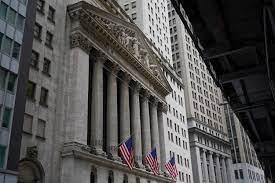WASHINGTON (AP): Stocks are tumbling on Wall Street Wednesday as worries about the strength of banks worsen on both sides of the Atlantic Ocean. The S&P 500 was 1.4% lower in early trading, while markets in Europe slumped even further as shares of Switzerland’s Credit Suisse tumbled to a record low. The Dow Jones Industrial Average and the Nasdaq composite also fell sharply at the open. Credit Suisse shares tanked following reports that its top shareholder won’t pump more money into the bank. Three recent bank failures in the U.S. have investors on edge, and the Credit Suisse news prompted renewed selling in bank stocks both in the U.S. and Europe.
THIS IS A BREAKING NEWS UPDATE. AP’s earlier story follows below.
U.S. futures tumbled Wednesday and bank stocks around the world slumped as anxiety over the health of the global banking system surfaced again with new potential troubles arising at Europe’s Credit Suisse.
Futures for the benchmark S&P 500 slid 1.7% and the Dow Jones Industrial Average fell 1.6% before the bell.
Large and mid-size banks in Europe and the U.S. sank sharply before U.S markets opened, particularly in Europe. Major European banks fell between 5% and 10%, though Switzerland’s Credit Suisse skidded nearly 25% to all-time lows. That decline comes after media reports that Saudi National Bank representatives said they could not shore up their investments in Credit Suisse, citing regulatory concerns.
Confidence in the banking system has eroded in just a matter of days following the failures of Silicon Valley Bank on Friday and Signature Bank on Sunday.
Most of the premarket decliners in the S&P 500 early Wednesday were regional banks, with Zion Bancorporation, KeyCorp, Commerce and Regions all sliding between 5% and 8%. Bigger banks also lost ground, with Wells Fargo, Bank of America and Citigroup all fell between 3% and 4%.
Banks have struggled for the better part of the year as higher interest rates has fewer people and businesses taking out loans, part of the Federal Reserve’s goal as it tries to cool the economy and bring down four-decade high inflation.
Investors returned to the bond market Wednesday, sending yields lower again after they recovered somewhat the previous day. The 2-year yield fell back down to 4.05% from 4.25% late Tuesday, and the yield on the 10-year slid to 3.53% from 3.69%.
Stocks rallied Tuesday after the government said consumer prices decelerated from the previous month, mostly in line with analysts’ expectations. The data showed core inflation, with volatile energy and food prices stripped out to show a clearer trend, was 0.5% in February over the previous month, edging up from January’s 0.4% gain. The Fed pays close attention to core inflation in deciding on monetary policy.
Investors fear the Fed might respond to enduring upward pressure on prices by speeding up the pace of interest rate increases to dampen economic activity and inflation.
The Fed faces a dilemma over how to respond when banks already are under strain after the fastest pace of rate hikes in a decade knocked down prices of their assets.
President Joe Biden and regulators have tried to assure the public that risks are contained and deposits in other banks are safe.
Later Wednesday, the government reports on retail sales, giving the Fed more data to chew on before its meeting next week where the central bank will decide whether or not to raise its main borrowing rate for the ninth time in a row.
In European trading, London’s FTSE 100 tumbled 2.4% at midday, the DAX in Frankfurt retreated 2.8% and the CAC 40 in Paris skidded 3.4%.
In Asia, the Shanghai Composite Index rose 0.6% to 3,253.31 after Chinese economic activity improved in January and February but less than expected following the end of anti-virus controls.
The Nikkei 225 in Tokyo advanced less than 0.1% to 27,229.48 after major Japanese companies announced they had agreed with unions to the biggest wage increases in almost two decades. Low wages are seen as a major drag on economic growth in Japan, but fewer than one in five workers belongs to a union.
The Hang Seng in Hong Kong jumped 1.5% to 19,539.87. The Kospi in Seoul surged 1.3% to 2,379.72.
India’s Sensex shed 0.2% to 57,783.79. New Zealand and Southeast Asian markets advanced.
In energy markets, benchmark U.S. crude slid $1.039 to $70.24 per barrel in electronic trading on the New York Mercantile Exchange. The contract plunged $3.47 on Tuesday to $71.33. Brent crude, the price basis for international oil trading, lost $1.19 to $76.26 per barrel in London. It lost $3.32 the previous day to $77.45.
The dollar was down to 133.52 yen from Tuesday’s 134.19 yen. The euro declined to $1.0594 from $1.0741.
On Tuesday, the S&P 500 rose 1.7% and the Dow gained 1.1%. The Nasdaq composite added 2.1%.







